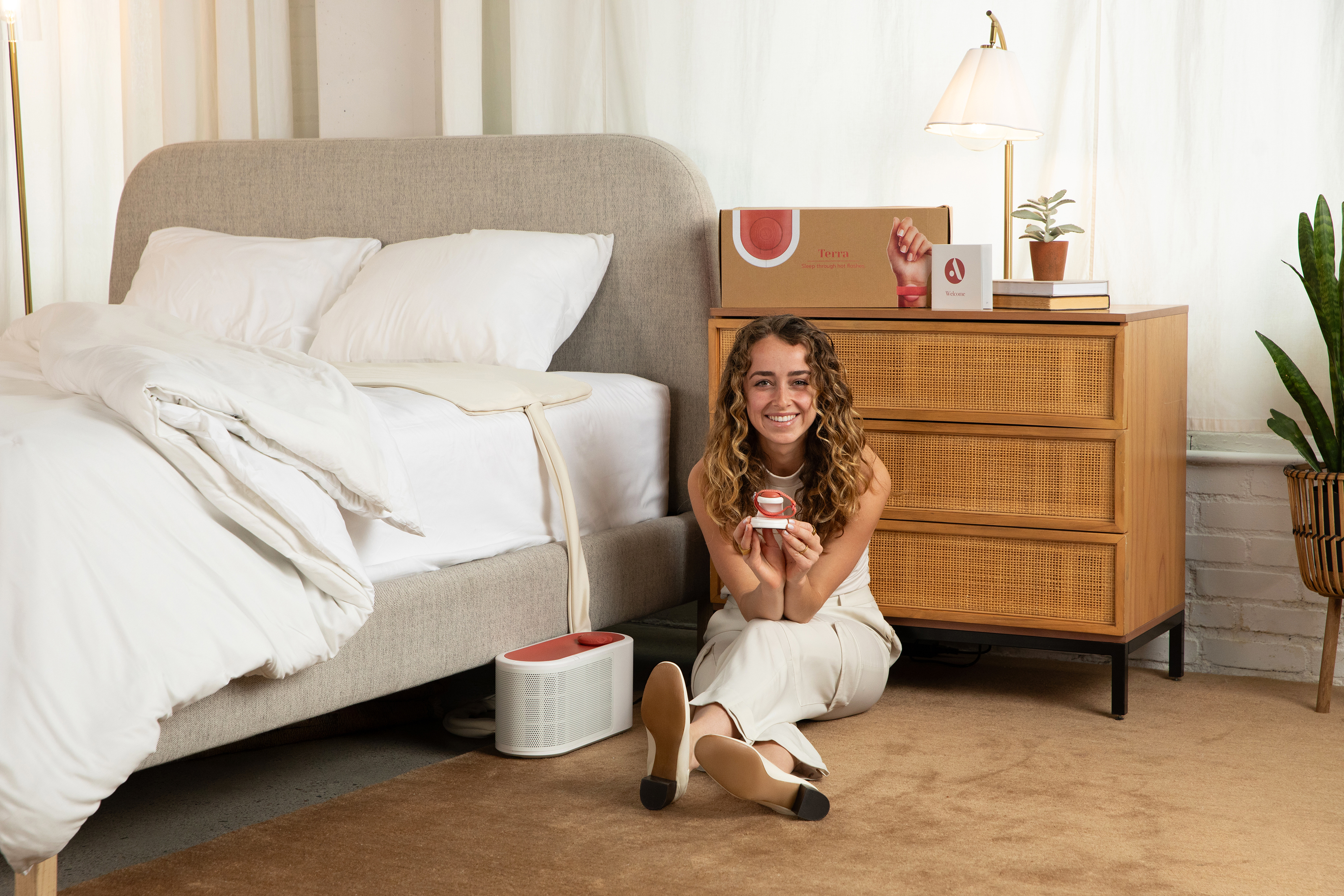Engineering Better Sleep During Menopause
-
-
Slice of MIT
Filed Under
Recommended

Some things in life are certain: death, taxes, and—for many going through menopause—the misery of waking in a sweat due to hot flashes. A new MIT startup is working to change that last one.
San Francisco-based Amira Health manufactures Terra, a patent-pending wearable bracelet and cooling mattress pad. Bracelet sensors monitor miniscule amounts of skin sweat, a marker of nervous system arousal. Terra uses this data to forecast an impending hot flash, queueing up the mattress to cool down before a customer even stirs.
“Some people describe it as like magic: You just put on a wearable and that wearable watches your biomarkers during the night. Once the hot flash is coming, your bed will start to cool down, and you can actually sleep through the hot flash,” cofounder Loewen Cavill ’20 explains.
Cavill launched the company after a dish session with her menopausal aunt. They were incredibly close, but Cavill had no idea that her aunt had been sleep-deprived for years due to debilitating night sweats.
“It was really taking such a toll on her, waking up four or five times a night. I thought it was just crazy, but it turns out, this is very much of the norm in menopause—it’s just taboo to talk about,” Cavill recalls.
Her aunt told her about nocturnal group texts between frustrated friends, swapping solutions and venting about sleeplessness. To Cavill, it seemed the problem was well-recognized by other women but less so by the scientific community.
Inspired to find a solution, Cavill and classmate Claire Traweek ’20 came up with the idea for Terra in a hackathon. Later, Cavill brought it up with Emilio Sison ’20 and Felipe Radovitzky ’20, her teammates in DeltaV, an MIT startup accelerator. Cavill wasn’t confident that two men would be sold on developing technology that could predict hot flashes until they shared that their own moms were suffering, too.
“And who doesn’t want to make their mom proud?” she says.
The group continued to iterate as an MIT Sandbox team, where Cavill met with several MIT mentors who’d launched their own improbable startups.
“I grew up in a small town: Milford, Ohio, where entrepreneurship was not a thing. At MIT, there’s a resounding belief that anything is possible, and they show you the people who have done the impossible,” Cavill says.
This is particularly true in the health space, she says, where she found plenty of MIT role models for the successful launch of businesses geared toward better health, including PillPack, Formlabs, Ginkgo Bioworks, Spyce Robotics, and Biobot Analytics.
“That’s what I love about MIT: They instill a ‘make the world better’ attitude, which I think is actually quite rare. That’s a value metric that was infused in us. So many companies that come out of MIT are objectively better for the world,” she says.
Now backed by e14, Supermoon Capital, MIT Sandbox, and others, the startup has raised $4.7 million in funding so far. They began manufacturing in early 2024, with shipments going out in July.
In the future, the company plans to increase the number of sensors in its wearable and cooling pads to monitor other health symptoms. Today, the team has eight employees, half of whom come from MIT, including CTO Sison and COO Radovitzky. The strong MIT presence isn’t an accident.
“The biggest thing that MIT teaches you is how to go from zero to one on your own, really fast. You learn to drink from the fire hose, and moving quickly without much previous experience is the exact type of training you need for a startup,” Cavill says.
Photo courtesy of Amira Health







